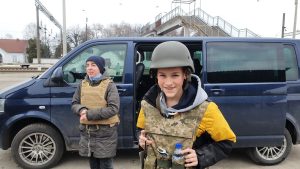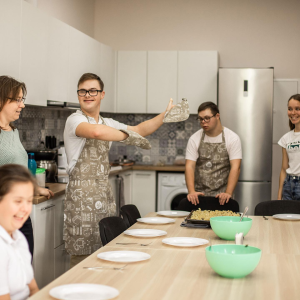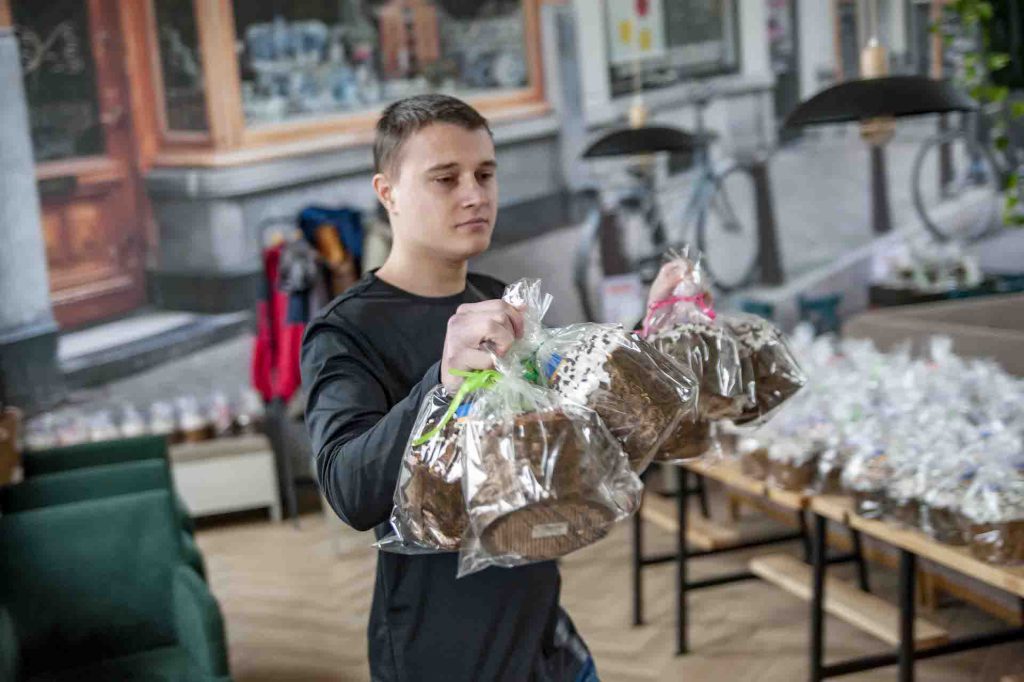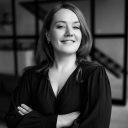Perspectiva 21.3 is a Ukrainian charity organization that protects the interest of people with intellectual disabilities. Their key project is the Center for Social and Labor Adaptation for Young People with Disabilities in Brovary, Kyiv region, where students acquire special skills and learn to live independently.
Before the war, students of the Center had an internship in Cafe 21.3 in Brovary. There, you could drink coffee and taste one of the most delicious cupcakes in the city and the whole region.

Food delivery to Shevchenkove by the humanitarian mission Bake4Ukraine. Photo credit: Perspectiva 21.3
The war changed everything. Almost all the wards left the city, and the team faced new challenges. From the beginning of the war until April 18, Cafe 21.3, together with Zeelandiia, cooked 108,000 free portions of soup for those in need and baked 65,248 loaves of bread and 6,862 cupcakes. These numbers are growing every day, as the cafe does not stop working.
The new Perspectiva 21-3 initiative is called Bake 4 Ukraine. Cafe 21.3. cooks meals for the residents of Brovary and surrounding villages, for the defenders of Ukraine, and the city centre of assistance to socially vulnerable groups.
While Bake 4 Ukraine is a separate activity, the Perspectiva 21.3 team has not abandoned its own mission. Over the years, the organization has built education systems for children and teenagers with intellectual disabilities through practice, and released author’s textbooks and training programs approved by the Ministry of Education of Ukraine. For now, the Center for Social and Labor Adaptation has suspended its activities. However, Perspectiva 21.3 continues to seek medicines for children with disabilities as their families’ reserves are running out.
The Zagoriy Foundation talked to Olga Sokolova, a Perspectiva 21.3 communications manager, about planning the work at a time when planning is complex and the strength of faith in one’s mission.
ZF: How did your organization work before the war?
OS: In 2010, based on a special boarding school №26 in Kyiv, the founders of our organization created the first experimental project to teach children with Down syndrome. It was the only class at the time where children were taught according to their needs. Until 2019, we worked as an educational project under the aegis of the charity organization ‘Down Syndrome’. Eventually, we became an independent charity called Perspectiva 21.3. We focused on people with intellectual disabilities over the age of 18 and their adaptation to adulthood.

Perspectiva 21.3 interns before the war. Photo credit: Perspectiva 21.3
However, the very idea that underlies Perspectiva 21.3 was born in the summer of 2003 together with a boy called Petro Vasylenko. Doctors asked his parents to sign documents for his refusal, but the family of the future founders of Perspectiva 21.3 did not do so. Having the opportunity to go to the Netherlands, the family decided to stay in Ukraine and change the public attitude towards people with Down syndrome here.
Today, the Vasylenko family made the same decision: they deliberately stayed in Brovary and cooked food for needy people based on Cafe 21.3. They also deal with organizing large-scale humanitarian aid coming from the Netherlands.
Could you tell us more about the educational project from Perspectiva 21.3?
Before the war, we had three classes: one had graduated, so two were left. Our main activity was the Center for Social and Labor Adaptation in the city of Brovary. Our graduates from school and several guys from Brovary came there: one boy with autism, the other with Down syndrome.
The Center’s idea is about learning professional skills and living as independently as possible. Students learned mathematics and the Ukrainian language; then, they had practical training and lunch. At this point, they parted: some students went to practice at Cafe 21.3, and others prepared dinner for themselves and their classmates.
Our experience of schooling is already ‘packed’ in textbooks. This includes a handbook ‘Learning with joy’, a textbook on Ukrainian language and reading for grades 1-4, and practical mathematics for grades 1-2. Shortly before the war, we also sent a textbook on mathematics for grades 3-4 to the Ministry to obtain the stamp, but it is hard to predict when we will receive it.
As for the centre’s experience, we have not shared it yet. In fact, we are still adapting our own and foreign experiences to Ukrainian realities, building a functioning model.
This work is currently suspended because our students have left the city, and such activities are impossible without them.
How did the idea for Cafe 21.3 arise? How does it work?
The founders of our organization, the Vasylenko family, have two highly socially responsible businesses. These are Bakery 21.3, which has been operating for more than five years, and Cafe 21.3, which is one year old.
According to the charter, 25 per cent of the profit of Cafe 21.3 is allocated to support the work of the charity organization Perspective 21.3. Thus, in addition to partners and fundraising, we can rely on ourselves as well.
Before the war, we had an extensive menu in the cafe — our chef Andriy had so many ideas that we even worked on expanding the kitchen.
With the start of a full-scale war, the first thing the founders decided to do was to bake bread and make soup for those who remained in Brovary. This is how the humanitarian mission Bake4Ukraine was born.

Easter cakes by Bake4Ukraine. Photo credit: Perspectiva 21.3
What is your focus now?
Currently, cooking and humanitarian aid are urgent issues. However, we are thinking about continuing our mission and carrying on the experience of 12 years.
Right now, the cafe does not work as a business but instead serves as an aid centre providing people with food and moral support. We are a Christian organization, so we try to do everything we can. At first, the food was prepared only by our chef. Then our founder Andrew allowed us to use the facilities of Zeelandia, where he is CEO, which allowed us to increase capacity.
The aid did not only include the delivery of soups, bread, and moral support. In addition, Andriy and Arenda also organized a massive amount of humanitarian aid from the Netherlands sent to Brovary by trucks. Then, our team received and redistributed everything.
How many people are there on the team today?
The team is actually small: the founders, the board chairman, and part of the cafe team; I work remotely. But the volunteer corps consists of more than 80 people.
Students are a painful issue for us — everyone has left, and accordingly, we cannot continue our studies. The only two girls that stay in Ukraine are in Kyiv, not Brovary. Because of the danger, It is currently impossible for them to establish logistics and go to classes.
Our teacher keeps conducting some zoom classes. However, many things cannot be done remotely, so we encourage our students to look for similar centres nearby so as not to lose skills.
Once again, our story is the story of creating a model: from the very beginning of school (school model) to support employment and then supporting living. All this happens in practice with real young people, step by step. In two years, we should have started to develop a model of supporting living, but now we do not know what the future will look like.
The war paused this work because the learning process without students is impossible. However, although the story of the model creation is currently on hold, the school experience remains.
As most young people with disabilities go abroad and do not know when to come back, it seems out of time. That is why we think about how to spread our model further.
I know that for 12 years, we have been developing systematically. This is our principle — to act not for the sake of action but for the sake of the result. Therefore, we will definitely continue our direct activities.
It’s not just work; it’s a life story. So, we will find a way out. We won’t give up — I can tell you for sure.
Olena Skachkova is the Editor-in-Chief of the Media of Great Stories, a project of the Zagoriy Foundation. This article was translated by Sveta Bakhshalieva.
The Bake 4 Ukraine project can be supported on the official website or via PayPal (perspectiva.fundraising@gmail.com). Read more about the daily life of the mission on the Bake 4 Ukraine Telegram channel.
This piece was first published on The Media of Great Stories, a project of the Zagoriy Foundation, on 29 April 2022. It is being re-shared in Alliance with permission.






Comments (2)
Very informative article! Thank you all and may God bless you and your activities. Praying 🙏 for you.
Mijn oomzegster is Arenda van de ree vasylenko wij horen via de groeps whats app het een en ander van hun ook dit bovenstaande bericht. Veel zegen met dit werk